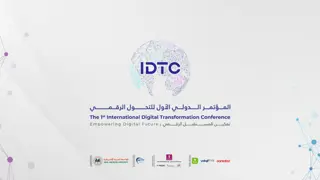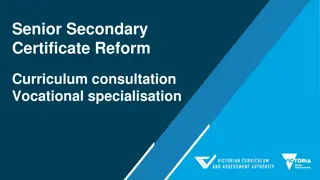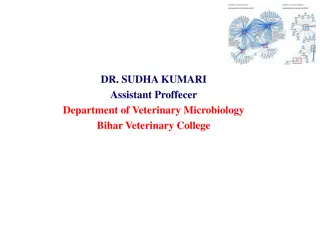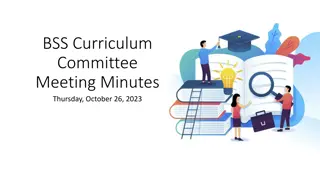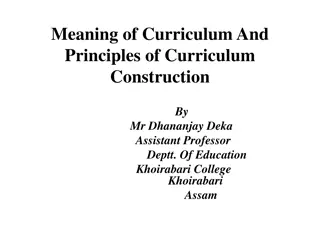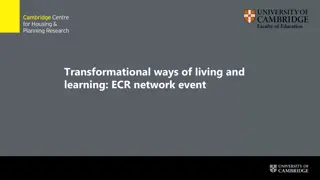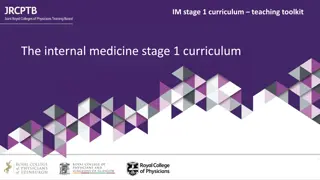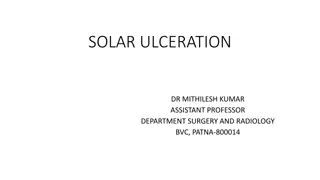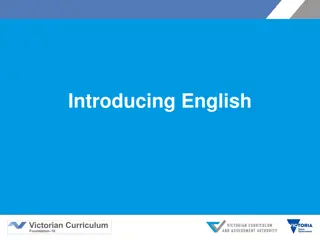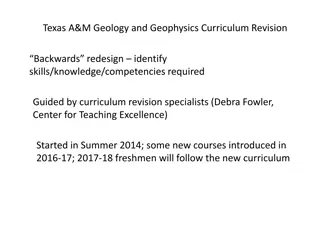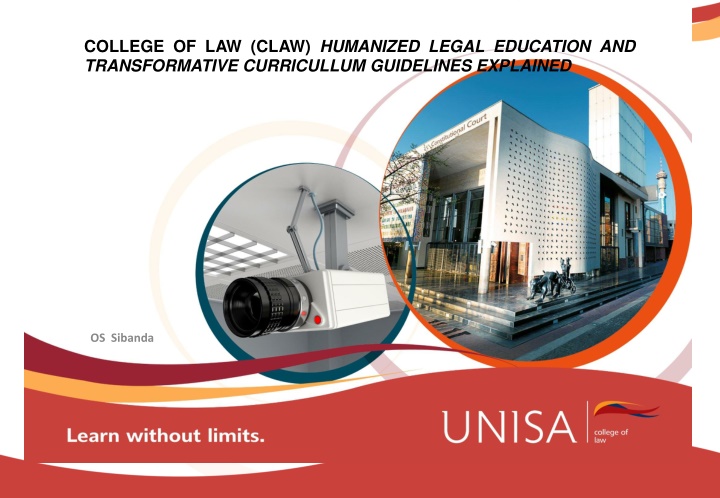
Transformative Guidelines for Humanized Legal Education
The College of Law (CLAW) and The African College of Law prioritize embedding African epistemologies into their curriculum through Africanization and decolonization processes. Concepts like curriculum transformation, decolonization, and alternative assessment measures are key aspects of reshaping higher education to serve humanity. The guidelines emphasize the importance of a local content focus, community engagement, and continuous renewal for excellence in legal education.
Uploaded on | 0 Views
Download Presentation

Please find below an Image/Link to download the presentation.
The content on the website is provided AS IS for your information and personal use only. It may not be sold, licensed, or shared on other websites without obtaining consent from the author. If you encounter any issues during the download, it is possible that the publisher has removed the file from their server.
You are allowed to download the files provided on this website for personal or commercial use, subject to the condition that they are used lawfully. All files are the property of their respective owners.
The content on the website is provided AS IS for your information and personal use only. It may not be sold, licensed, or shared on other websites without obtaining consent from the author.
E N D
Presentation Transcript
COLLEGE OF LAW (CLAW) HUMANIZED LEGAL EDUCATION AND TRANSFORMATIVE CURRICULLUM GUIDELINES EXPLAINED OS Sibanda
THE AFRICAN COLLEGE OF LAW THE AFRICAN COLLEGE OF LAW SHAPING FUTURES IN THE SERVICE OF HUMANITY 1. The need to embed African epistemologies and African law and criminal justice into its programmes through transformation. 2. Through its community engagement and research initiatives consolidates the content of its offerings by experiences of the communities. curriculum infusing the lived
CONCEPTS Africanisation: Africanisation (or indigenization, as it sometimes) considered as the first important step towards transformation as a process requiring that the curriculum must have more local content. This in Africa implies that the content must be African-focused content. It may also include modifying euro-centric knowledge system to be accommodated within the African system as a temporary measure. AlternativeAssessment Measures: Methods of assessment have been developed to exhibit what students learn and their ability to use their existence knowledge to facilitate their own learning in the classroom. Curriculum: In simple terms curriculum means a list of topics to be taught. However, a more nuanced conceptualisation of curriculum is that it includes is that curriculum includes what is taught, how it is taught and assessed, as well as who the teachers and the students are. Curriculum Transformation: In the context of this Guideline transformation entails that curriculum must have a local content, and that tr n the context of the transformation goal looks into many variable including equity, efficiency, access, integration, and adaptability in the light of massification of Higher Education Institutions (HEIs). Curriculum transformation must have clear values that underpin the teaching and learning process and those include values such as uBuntu, language, social justice, and responsibility, and agency. Decolonisation: Embedded or assumed in Africanisation is that decolonization, which involves a deep sense of recognition of and challenge to colonial forms of knowledge, pedagogical strategies and research methodologies . It may also include modifying euro-centric knowledge system to be accommodated within the African system as a temporary measure. Transformation: An individual, collective, cultural and institutional, aimed at high performance, effectiveness and excellence. It entails improvement and continuous renewal guided by a sense of justice and ethical action, based on community engagement and achievement of a state that is demonstrably owned and controlled by the people.
WHAT INFORMS OR SHOULD INFORM OUR CT PROJECT 1. 2. 2011 CLAW Curriculum Transformation Statement. South African Human Right Commission Report : Transformation at Public Universities in South Africa relating to curriculum humanisation and transformation. Excerpts from Quality Enhancement Project: Phase 2 of the QEP: Curriculum Focus Area and Institutional Submission Specifications: QEP requires, for example, that we address the following questions at the institutional level speak to: What is the institution s approach to transformation? What initiatives have you undertaken in the past few years to address curriculum renewal and transformation that have been successful and how do you know? What thinking/theorisation about the value, purposes, and assumptions about knowledge and higher education have informed the process? In response to the student protests in 2015 and 2016, what further changes have been made related to curriculum renewal and transformation? Why were they made and how? Who participated in deciding to make and then making the changes? How are the changes being received by various stakeholders? What effects are the changes having and how do you know? What plans are in place for further efforts related to curriculum renewal and transformation in the next year or two? What unresolved challenges does the institution need to grapple with related to curriculum renewal and transformation? 3. a) addressing curriculum renewal and b) c) d) e) f)
THE 8 GENERAL ISSUES TO DEAL WITH WHEN CONSIDERING CURRICULAR 1. 2. Epistemological = What should count as knowledge?; Political = Who shall control the selection and distribution of knowledge; Economic = How is the control of knowledge linked to the existing and unequal distribution of power, goods, and services in society?; Ideological = What knowledge is of most worth?; Technical = how shall curricular accessible to students?; Aesthetic = How do we act artfully as designers [of our modules]?; Ethical = How shall we treat others responsibly and justly in education?; and Historical = What traditions in the field already exist to help us answer these questions? (Beyer and Apple, 1988: 5) 3. 4. 5. knowledge be made 6. 7. 8. 5
TRANSFORMATION AND DECOLONISING THE CURRICULUM Decolonising the Mind: The Politics of Language in African 1. Ngugi wa Thiong o s Literature (1981:94) : Consider relevance to our situation [and the] contribution towards understanding ourselves . Harry Garuba of Kenya s ( What is an African Curriculum http://mg.co.za/article/2015-04-17-what-is- an-african-curriculum/ 2015 ) consider as central transformation of the curriculum fundamental question of place, perspective and orientation Guruba Approaches: Content-driven additive approach: Seeks to expand the curriculum already in place . PROBLEM- Encourages maintenance of status quo Contrapuntal Thinking Approach: contrapuntal thinking at every level; it needs a contrapuntal pedagogy that brings the knowledge of the marginalised to bear on our teaching. rethink how the object of study itself is constituted and then reconstruct it and bring about fundamental change . This approach is the quest for relevance as Ngugi (1981:87) argued that Africans mud dee clearly in relationship with ourselves and other selves in the universe . He calls this a quest for relevance . Need for deliberative interruption of the usual hierarchy of knowledge : Done at humanities courses project involving UCT, Rhodes University, and the University of Fort Hare (African experience in different for including teaching postcolonial theory; deconstructing dominant canons or worldviews; using African examples, texts, and contexts; correspondent examples or theories from other parts of the so-called third world; or a pedagogy that used African languages as learning resources Morreira 2015) The above was acknowledged in CLAW Curriculum Transformation Statement of 2011 2. 3. 6
HOW TO GO ABOUT IT Address halo effect that surrounds the terms: Transformation Change Africanisation Decolonisation Decoloniality Careful selection of curriculum content to avoid alienation form: from institutional contexts; the knowledge taught; Teaching approaches. Humanize the whole teaching enterprise, by considering: Cultural dimension Geographic dimension Political dimensions Social dimensions 7
MAJOR CONCERNS Human development: An overlooked objective of CT The existence of a relationship between human development and CT must be a contentious fact. Unfortunately, academic discourse and analysis of CT and decoloniality often put human development in the periphery. Transformation is not only about content or the language of instruction of the content, and equity profile of staff. It also entails the influence or impact the profile of the teaching academics have on how these students engage with the curriculum Box-ticking approaches and me compliance E.G., Questions papers making references to African names. Lack of a model de-colonized module See UCT - course entitled IP Law, Development and Innovation developed by the Open AIR project since 2008. Developed with the full consultation of African scholars and experts in the field who have a strong understanding and experience of the African context (Ncube 2016:39). 8
PROPOSED CURRICULUM TRANSFORMATION PRINCIPLES IN IN SUPPORT OF CLAW OPERATIONAL TEACHING, LEARNING & STUDENT SUPPORT, & RESEARCH 4 Ensure that modules offered by the College increasingly reflect, in both content and delivery, the principles of curriculum transformation and Africanisation (Aligns with institutional objectives 1.2, 1.3, 3.1 & 8). 1. Analyse and interrogate the current curriculum or the pre-transformation curriculum first: Curriculum transformation to first be pursuit through the analysis or current curricula in the widest sense of curriculum (outcomes, content, assessment, delivery, language, student support, technology). Decolonisation of module content: Modules in the CLAW must discard antiquated, unconstitutional, and alienating norms, principles and values; assessment examples that seek to maintain the ideal of colonisation of the African education and knowledge systems. NOTE: Module description and modules objectives/purpose statement is the key indicator of transformation of the content: It must be clear from the module description and module objectives that the content to be offered will be a transformed content. This must be reflected in the module Form, which must include, for example, multicultural module objectives. EAXMPLE 1: Investigative Principles of Policing IIB OVM2602 2. Purpose: The purpose of this module is to provide students with a professional development programme in the policing field. More specifically, it aims to equip students with value, knowledge and skills to enable them to investigate and solve selected crimes successfully. Students will be shown how knowledge or related subjects, such as Criminal Law and Law of Criminal Procedure and Evidence, can be applied to crime investigations. This module seeks to incorporate aspects of Africanisation and indigenization of law enforcement. Whilst it also recognise that the constitution is home grown and that the Bill of Rights advocated for Ubuntu, social responsibility and humanized law while investigating different crimes.
PROPOSED CURRICULUM TRANSFORMATION PRINCIPLES IN IN SUPPORT OF CLAW OPERATIONAL TEACHING, LEARNING & STUDENT SUPPORT, & RESEARCH ..(Continuation 2) 4 Ensure that modules offered by the College increasingly reflect, in both content and delivery, the principles of curriculum transformation and Africanisation (Aligns with institutional objectives 1.2, 1.3, 3.1 & 8). 1. Offering a humanised Law and Justice education, and humanised programmes, which takes cognisance of an insoluble interdependency between rights and responsibilities. Mere reference to uBuntu does not make a module transformed or considered as transforming modules. So the mere replacement of English names with African names in assessment or factual scenarios. Give due recognition to different cultures and Languages: All different cultures and their languages are the basis of law and justice, and custodians of knowledge which must be respected, promoted protected in all programmes to the extent possible. (This is so despite the fact that English is adopted as the official language of tuition and learning at Unisa) Acknowledge and appreciate the agency of all human beings, and their epistemologies : All human beings as active agents who create knowledge and language; who speak, deliberate, interact, advocate and act. This agency must be truly reflected in the CLAW s academic programmes teaching and learning, and assessments. Offer socially responsibility curriculum: CLAW s academic programmes teaching and learning, and assessments have the responsibility play integrative role that lays a foundation for an inclusive and just society (social justice and transformative constitutionalism), through curriculum that advances a holistic existence of all humanity and that nurtures graduates who are able to act as agents of humane social change (graduateness). Humanising the Law and Justice Programmes: CLAW legal education must resonate with notions of justice upheld by ordinary people, and embody humanness in line with uBuntu. 2. 3. 4. 5.
PROPOSED CURRICULUM TRANSFORMATION PRINCIPLES IN IN SUPPORT OF CLAW OPERATIONAL TEACHING, LEARNING & STUDENT SUPPORT, & RESEARCH ..(Continuation 3) 4 Ensure that modules offered by the College increasingly reflect, in both content and delivery, the principles of curriculum transformation and Africanisation (Aligns with institutional objectives 1.2, 1.3, 3.1 & 8). 1. Re-center African and other relevant non-European /Non-Western knowledge systems: CLAW legal education must re-center other knowledge systems, in particular African /Indigenous and other non-European/Western systems, by recognising their roles as central to the creation of law and notions of justice (in the teaching and assessment of modules such as, for example, Historical Foundations of South African Law HFL1501; Civil Procedure; Law of Property; Law of Intellectual Property, etc). 2. Build and maintain sustainable transformed academic and structural transformation: Schools in the CLAW and their academic departments must always strive to create and maintain an environment that promotes: trans-disciplinarily in research, learning and teaching; cooperation and collaboration in tuition and research; appropriate distribution of resources; indigenous knowledge systems. Fostering a contextualize legal (Africanisation/indigenisation): The legal and criminal justice education must be contextualised to other imperatives Africanisation/indigenisation of the law and law enforcement in line with the epistemology of transformation. Moreover, the curriculum /module content must reflect the social context in which it is located and fully recognise the social world in which it has been shaped. Re-centering of other knowledge systems include the recognition that: Law and justice are epistemologically and culturally determined; Every cultural perception of law and. 3. and criminal justice education including but not limited to
PROPOSED CURRICULUM TRANSFORMATION PRINCIPLES IN IN SUPPORT OF CLAW OPERATIONAL TEACHING, LEARNING & STUDENT SUPPORT, & RESEARCH ..(Continuation4) 4 Ensure that modules offered by the College increasingly reflect, in both content and delivery, the principles of curriculum transformation and Africanisation (Aligns with institutional objectives 1.2, 1.3, 3.1 & 8). Ensure substantive and genuine application of indigenous African law and principles: Modules development, revision, and/or offering must avoid the displacement and/or erosion of indigenous African law in the application of the principles relevant to a particular area of the law. Foster humanised student support at all times: Academics and support staff must always observe and exhibit / provide the respectful, humane and caring support to our students in respect to the humanisation of their learning and their professional aspirations. Use of multicultural courseware: Modules to prescribe (and recommended) courseware including textbooks and other academic publications are reflective of the transformative principles. (Academic publications but African authors must also be prescribed and not merely listed as recommend or additional non-examinable reading material). Note: Whilst curriculum structures and modules offering should not struggle to enhance equity in courseware, it is acknowledged that the South African legal curriculum courseware is nested within legal education environment that favours Western-European or non-Black courseware. But this is not the reason to not to change the status quo. There is valuation and wealth of African authored scholarship that is waiting to be utilised.
TRANSFORMATIVE CONSTITUTIONALIMS PRINCIPLES 1. Internationalise transformative teaching and learning: The modules content (and the programme in general) must internationalise transformative teaching and learning characterised by explicit reference to the values and principles contained in the South African Constitution of 1996 and the resultant constitutional jurisprudence. This is relevant even in modules not dealing with the Constitution and administrative as a subject-matter. Embrace transformative curriculum: Transformative constitutionalism as a requirement for the CLAW curriculum means that we must change and not allow the teaching and learning responsibilities to be business as usual and to be stagnanant or be stagnated by the strictures of certain established norms/legislation. In sum, our teaching and learning induce large-scale social change ; must be innovative and involve some measure of judicial activism. Promote and protect social justice through our module offering: Transformative constitutionalism as a programme standard envision the purpose of higher legal education as encompassing social justice imperatives, and the eradication of the inequalities in our communities. NOTE: According to the late Justice P Langa of the Constitutional Court - Transformative Constitutionalism. (2006) Stellenbosch Law Review, Vol 17:3, pp 351 353, - it is no longer sufficient for judges to rely on the say-so of parliament or technical readings of legislation as providing justifications for their decisions but that judges bear the ultimate responsibility to justify their decisions not only by reference to authority, but by reference to ideas and values . 2. 3. 4.
OUR CURRENT APPROACH TO CT The legal principles relating to Forms of Business Enterprise underpin the values of Ubuntu, social justice and diversity. Moreover, we are gradually incorporating some of these values in the formative and summative assessments. In the future we endeavour to incorporate these values vigorously in our assessment Ubuntu; fairness; humanising the law and graduateness How? What exactly is done in the module? What exactly is done in the module? Ubuntu ; African Philosophy; Africa Philosophy and Punishment Ubuntu Ubuntu approach / Social Responsibility & Graduateness What exactly is done in the module? What exactly is done in the module? When is it to be done? What exactly is uBuntu Approach? What exactly is done in the context of curriculum transformation and decoloniality? What exactly is done here? What do you mean? Is there no effort to implement Curricullum transformation principles What is done here? Possibly Humanisation of the Law / Ubuntu approach. Ubuntu approach South African legislation; Assessment scenarios SA context; Glossary of terms include Latin/legal & English& Zulu Ubuntu and mitigation of Eurocentric bias. Implemented where applicable Social Responsibility & Graduateness. To be determined in consultation with lecturers With the revision of existing, and drafting of new learning units the authors will focus specifically on the Africanisation of the contents of the new module. This sounds a promising start. Looking forward to the new learning units?
EXPECTATIONS TRANSFORMATION FOR SELF-EVALUATION DURING CURRICULUM PROCES 1. It is required that every curriculum transformation and self-evaluation process be guided by several general principles, including but not limited to: That it must be an on ongoing cyclic process. It be aligned to all the CLAW Teaching and Learning and Quality Assurance Plans/Strategies. It must be evaluative rather than descriptive. It must clearly identify the departmental / module strengths that must be maintained and areas in need of improvement
COMPLIANCE JUDGMENT SCALE 1. WHAT MUST BE JUDGED: Module objectives and purpose statement Module content Assessment Quality Assurance Courseware: Prescribed texts; reading list; and other learning materials 2. JUDGMENT CRITERIA LEVEL ONE: Module objectives and purpose statement are traditional; and pre-dominantly euro-centric. LEVEL TWO:Module objectives and purposes statement acknowledges all epistimologies and seeks to incrementally infused curriculum transformation and transformative constitutionalism principles in the learning units contents. LEVEL THREE:Module objectives and purposes statement equally integrates all the relevant epistimologies; and set as an indispensable requirement curriculum transformation and transformative constitutionalism principles as the main part of the learning units contents.
SAMPLE CHECKLIST ON CONTENT No Content Standard and Need Yes No 4.4 Texts, Readings, Materials NI 1 Is Africanisation and decolonization of your module a priority demonstrated by the content of your module? Are the transformation and transformative constitutionalism principles approaches to content, instructional activities, and assessment infused throughout the term ? 2 3 Whose view(s) is (are) represented by the content you selected? Does the content provide a comprehensive truth, inclusive of different perspectives? 4 Does the content include perspectives of (or information about) diverse groups? 5 Do examples used to illustrate key concepts/theories include a variety of groups? 6 Does the content promote critical analysis of social realities, with particular reference to the South African and African realities? Does the curriculum content selected avoid alienation from institutional Contexts; the knowledge taught; and teaching approaches? 7
SAMPLE CHECKLIST ON STUDY MATERIAL No Content Standard and Need Yes No NI 1 Does the content include the contributions and histories of South African Liberation Movements as they impacted on law and justice? Texts, Readings, Materials 2 Does the content include the contributions and histories of various cultural groups as sites of knowledges and different epistimologies? 3 Do the prescribed and recommended readings/resources present multiple perspectives on issues? Avoid stereotypes? Does the content and how it is presented promote students' critical analysis of viewpoints? Is it Eurocentric or multicentric? Does the content address how knowledge in the discipline is created? How race, ethnicity, social class gender etc. influence the construction of knowledge? 4 5 6 Does your module prescribe or recommended readings / texts of African law and justice scholars / philosophers? Are you prescribed or recommended readings/texts sensitive to the social realities of the South African and African communities? Are students' racial attitudes examined in any way? Are there opportunities for students to develop positive racial attitudes and values? Are nontraditional perspectives additive, balanced with traditional, or central? 7 8 9 10 Do you infuse your community engagement outcomes/results into your module content and/or prescribe it as one of the learning materials?
SAMPLE CHECKLIST ON INSTRUCTIONAL APPROACHES No Content Standard and Need Texts, Readings, Materials Yes No NI 1 Do you implement research-based instructional strategies consistent with current theories of learning? 2 Do the instructional methods encourage critical analysis, application of knowledge to real world problems, and transfer of skills to new situations? 3 Do you link new concepts to and take advantage of students prior experiences? 4 Do they encourage cross-racial cooperative grouping within and outside of class? 5 Do they accommodate students various approaches to learning? 6 7 Do they encourage competent oral and written communication? Do your instructional strategies positively impart to graduates comprehensive and sound knowledge and understanding in relation to: the South African law and the legal system; the associated values; and; the historical background?
SAMPLE CHECKLIST ON ASSESSMENT AND QUALITY ASSUARNCE No Content Standard and Need Yes No NI 1 Do your assessment tasks address both the learning outcomes and graduate attributes listed for the subject? 2 Do you consider student workloads in scheduling and designing assessment tasks for this subject and in relation to assessment tasks in other subjects likely to be taken at the same time? 3 Are your assessment tasks balanced? include both developmental ( formative ) and judgemental ( summative ) tasks. 4 Do the assignments permit students to apply their preferred approaches to problem solving (e.g., through choice) and encourage mastery of other approaches? 5 Do the assignments engage students in meaningful self-reflection? Do they engage students in analysis, synthesis, creativity, and application? 6 Do your assessment requirements permit a range of alternatives to meet diverse ways of demonstrating learning? Do you employ alternatives that provide comprehensive insight into students achievements and gives authentic information about their knowledge, abilities, skills, attitudes, and competences which are developed during the teaching process? 7 Does your alternative assessment have the characteristics of alternative assessments, including: asking students to perform, create, produce, or do something; using tasks that represent meaningful instructional activities; invoking real-world applications; encouraging higher-level thinking and problem-solving skills; using human judgments, and not machine scoring? 8 Are there opportunities for students to provide documentation of their learning activities, ideas and reflections (e.g., through portfolios, etc)? 9 Do your alternative assessment such as portfolio assessment, if any, encourage students to be more autonomous, be independent learners by taking charge of their own learning, able to make decisions, participate in the self-assessment process of their own work? 10 Are rigorous standards maintained and support provided to enable students to meet the LLB Standards? Do students receive explanatory and diagnostic feedback as well as marks as part of this support? 11 Does your module include criteria for markingin which learning outcomes are clearly articulated and criteria for levels of achievement are described, with marks allocated accordingly? 12 Do activities and assignments encourage oral and written communication? Is the conceptualization and overall design of your module encourage / instill critical thinking skills and the development of research skills? 13 Do assessment activities rrecognize a connection between students cognitive, affective and conative abilities? 14 Do activities and assignments present opportunities for taking action on social problems? Do assignments and other evaluation activities assess the degree to which students achieve the transformation and social justice objectives? 15 Does you module employ peer-learning and/or peer discussions on myUnisa? If the answer to the above is yes: Do you establish ground rules regarding respectful participation in discussion? Do you present opportunities to foster cross-cultural competence, positive racial attitudes, critical thinking, and decision-making? 16 Does feedback on assignments provide sufficient detail to enable students to know what they are doing well and how they can improve? 17 Are there accommodations for students with disabilities?
SAMPLE CHECKLIST ON LEARNER SUPPORT No Content Standard and Need Yes No NI 1 Is the learner support offered in the module group informed by the general principles for learner support at Unisa? These are: Learner Centredness any information, guidance and advice provided should be aimed at enhancing students capability and fostering their personal autonomy; Confidentiality the services offered should operate within established conventions of confidentiality on all personal and academic issues; Impartiality support and guidance should be equitable, impartial and include referring the student on to other sources where appropriate; Accessibility guidance and support should be accessible to all students at all stages of their programme of study; and have regard for; Equality and Diversity support and guidance should be offered in accordance with the University s policies on equality and diversity. 2 Do you ensure that students are aware of the nature, extent, purpose and location of all the services and facilities for guidance and support relevant to your module; and how best to access and benefit from this provision when needed? 3 Have you listed all the relevant support services in your Tutorial Letter 101 (e.g., library collections; services for students with disabilities)? 4 Are all materials and equipment accessible to students with special needs (e.g., students with disabilities, financial needs)? 5 Are technology tools used to document student learning and performance? Or to ease student learning and make teaching more accessible? (For example: Videotapes, audiotapes, photographs, and slides)? 6 Are opportunities created for formal or informal study g r o u p s ? 7 Are opportunities created and /or activated on myUnisa site of your module for discussions with your constant interaction with the students during their discussions? 8 Is the module leader s office or members of the module group office (and e-tutors as the case may be) accessible? (or contact reliably possible through e-mail, phone)
EXAMPLARY RIGHT DIRECTION DEVELOPMENT I.R.O MODULAR CT 1. CMY2601 Introduction of substantive unit of African research methodology 2. Proposed HFL1501: Epistemological diversity: More focused attention of indigenous law as part of the foundations of the South African legal system Consideration of the role of SA Liberation Movements in the development of the law as a complete stand-alone unit: This speaks to the CT principle of agency.
EXAMPLARY RIGHT DIRECTION DEVELOPMENT I.R.O MODULAR CT[2] 1. LJU4801 Legal Philosophy 2. Diversity of content and literature important (and achievable) see for example: A book by John Murungi - An Introduction to an African Legal Philosophy which focuses attention on philosophy. The link between law and philosophy is brought into relief, which is done through an African context. An attempt is made to spell out what is African about legal philosophy without being cut off of African legal philosophy from non- African legal philosophy. The book draws attention to the view that a basic component of African legal philosophy consists of an investigation of what it is to be an African, and because an African is a human being among other human beings, the investigation is about what it is to be a human being .One feature that will strike one as one reads the book is that the book approaches African legal philosophy as a means of decolonization of African culture. African legal philosophy can accomplish this intelligently and effectively if it is itself decolonized. In doing this it contrasts sharply with mainstream Western legal philosophy.
EXAMPLARY RIGHT DIRECTION DEVELOPMENT I.R.O MODULAR CT[3] Consider the impact of LJU and the interest it will generate if among the pictorials in the Study Guide of 2012 you have John Murungu alongside Plato; Aristotle; St Thomas Aquinas; The SG at 2.4.3 discusses ALP, but the guide clearly states at page 31 that ALP that the Western criteria for defining philosophy ..are not necessarily present . But at least the authors highlighted the contribution of African philosophers as Kwasi Wiredu; Nduka and Njoku. philosophy and legal
OTHER POSIBILITIES LML4801 AND LML4802 1. Law of Competition and Trade Marks (LML4802) and the Law of Negotiable Instruments, Intellectual Property and Competition (LML4801) are one of the modules that are not necessarily difficult to develop using and/or in consideration of our Curriculum Transformation and Decolonisation Agenda; 2. Section B which deals with Trade Marks from unit 10 Unit 19, for example, can benefit from: Addressing geographical indicators (GIs) Having activities or scenarios that are not only Western/Euro-centric. THE ABOVE CAN BE SAID I.R.O LML4801 particularly Unit 4 (Pages 240 251 of the SG)
OTHER POSIBILITIES CIVIL PROCEDURE 2601 The module is about dispute settlement to be simplistic With the introduction of Court-Annexed Mediation in SA module must be transformed to fully take into account this development beyond the current Part 2 (pages 26 52) dealing with alternative dispute resolution (ADR) from a western perspective. The Unit in CAM will enable the lecturers to fully take into account and address African dispute settlement approaches that can be court-annexed in a civil suit. Part 5 on matrimonial jurisdiction (pages 120 124) can be transformed to fully cover divorce matters in indigenous; Muslim; Partnerships; and other spousal unions. The compulsory reading at page 121 does not even include the Recognition of Customary Marriages Act which marriages performed under African polygynous marriages, are recognized as legal marriages. INFACT: this modules can benefit from alignment with Unit 6 of the African Customary Law (IND2601) that deals with the dissolution of customary marriages. In my view this unit must as be made part of CIP260 with the necessary adjustments. 120 of 1998 in terms of customary law, including
OTHER POSIBILITIES CRIMINAL LAW 2601 (and sentencing) Nothing in terms of the LLB qualification standards and other frameworks stops this modules from having a unit of African Criminal Law This unit can benefit from Unit 5 of IND2601 (pages 169 186) that deals with African Customary Criminal Law. The same can be said about the module on sentencing.
OTHER POSIBILITIES PRIVATE LAW (PVL1501; 2601; 3701 & 3702) Nothing in terms of the LLB qualification standards and other frameworks stops this modules from having a unit of African Criminal Law This unit can benefit from Unit 2 and 3 of IND2601 (pages 169 186) on Law of Persons; Family Law; Marriage Law; and the Law of Property and Succession.
OTHER POSIBILITIESWorld Trade Law - LCP4808 The purpose of the module is stated as: To gain a knowledge and understanding of the nature and basic principles of the GATT and GATS; its relationship with national law; and its practical application within both the international and the South African contexts, through a study of the history and philosophy of the General Agreement on Tariffs and Trade (GATT); the substantive provisions of the GATT; the World Trade Organisation (WTO); the resolution of disputes in terms of the agreement on the WTO; the effect of the provisions of the GATT on the rights of the individual; Any innovative teaching of this module can easily bring into issues of curriculum transformation particularly relating to uBuntu principles and using African epistimologies to inform this Western orientated subject. See below for example: A lecturer in this module must be able to be reflective and flexible to teach WTO dispute settlement under the Dispute Settlement Body (DSB) differently, keeping in mind that the DSB needs to embrace and pay due regard to world-views and philosophies consistent with the WTO s principle of inclusivity, and peaceful settlement of disputes. uBuntu will be a perfect African philosophy, for example, that can be used by the DSB TO maximize the achievement of amicable solutions to disputes, and compliance with DSB decisions. In essence, curricula transformation will be in the form of legal pluralism in the WTO dispute settlement decision-making processes. In the context of assessment a witty student (or should I rather say a witty lecturer) will respond by acknowledging that the WTO Agreement on the Trade-Related Aspects of Intellectual Property (TRIPS), establishes a framework for the use and regulation of intellectual property rights (IPRs). However, will go further to note that flexibilities have been built into TRIPS to make access to patented pharmaceutical medicine possible in recognition and acknowledgement of the consequences the restriction on access to pharmaceutical products have the ability of many developing countries addressing public-health problems facing them and then argue the use of clinically unproven as justified by GATT Article XX exception on morality. For the African continent our morality and uBuntu does not allow paying wilful blindness to suffering. In allowing uBuntu and African morality argument to operationalise GATT Article XX the assessment will be taking consideration of the need for CT and transformative constitutionalism.
POSSIBLE IMPLEMENTATION APPROACHES Food for thought 1. Pilot project for the development of a fully transformed CLAW modules for each School. E.g., 5 per School; 2. NQF Level implementation of the CT principles in modules approach 3. Departmental specific implementation 4. First running CT compliance external audit / peer reviewer audit using the developed checklist as an instrument. approach
REFRENCES 1. Garuba. What is an African Curriculum http://mg.co.za/article/2015-04- 17-what-is-an-african-curriculum/ transformation of the curriculum fundamental question of place, perspective and orientation 2. Moreira. Steps Towards Decolonial Higher Education in Southern Africa? Epistemic Disobedience in the Humanities. 2015 Journal of Asian and African Studies. 1 -15. 3. Mbembe. Decolonizing Knowledge and the Question of the Archive (2015). 4. Ngugi wa Thiong o. Decolonising the Mind: The Politics of Language in African Literature (1981). Ncube. Decolonising Intellectual Property Law in Pursuit of Africa s Development. The WIPO Journal, 2016 vol 8 Issue 1, at 34 Sibanda, O.S. (2012). Towards Access to Affordable Essential HIV and AIDS Medicine in South Africa: uBuntu and the Essential Facility Access Doctrine Claims. in Delener N., , Fuxman, l., Lu, F.V & Rodrigues, S. Mapping the Global Future: Evolution through Innovation and Excellence, 948 955. Global Business and Technology Association. 1. And may others 2015 ) consider as central 31






